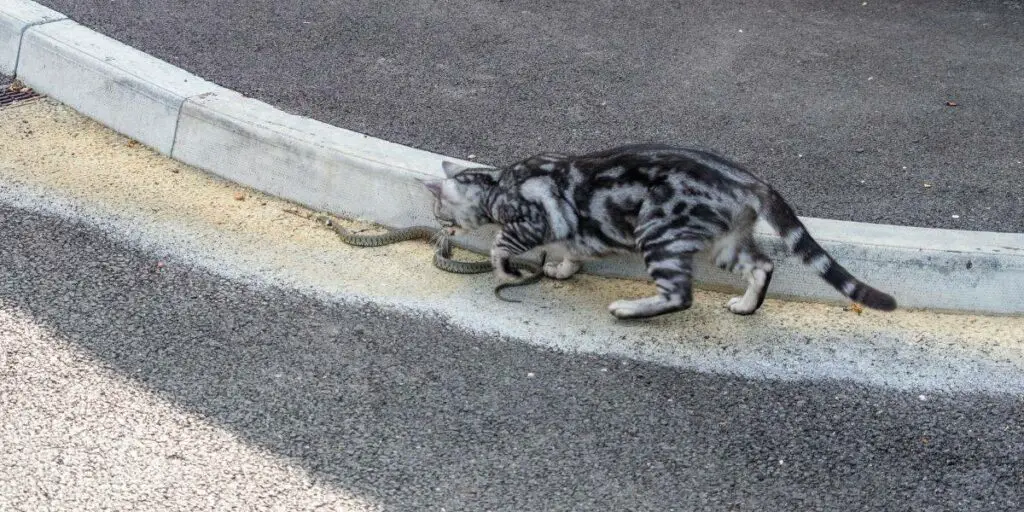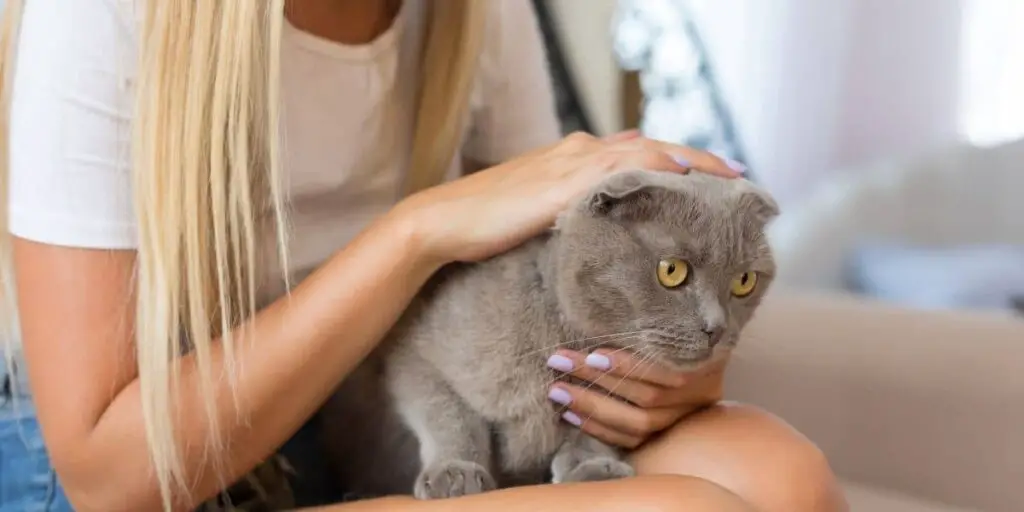Animal lovers all over the world keep pet cats; they are one of the most common household pets. However, if you have a passion for pets, you will most likely want to keep more than just a single cat.
Snakes are a great pet for those who want something a little different to your typical furry friend but due to their carnivorous nature, pet owners may be a little sceptical about keeping snakes with other animals.
Snakes are opportunist hunters and while the don’t tend to eat cats as part of their natural diet, if they are presented with the opportunity, they will almost certainly give it a chance.
But that isn’t to say that you cannot keep a pet snake if you have cats, or vice versa. These animals can live together in the same home, but as the owner, you are responsible for keeping them safe and happy.
In this article, we will take a closer look at how you can successfully keep your slithery companion alongside your feline friend.
Do Snakes Eat Cats?
Before you start panicking that your snake is going to make a meal of your moggy, there is one important thing to keep in mind. Snakes will only eat a cat if it is a suitable size. If you own a tiny ringneck snake, it is hardly likely to try and feast on your household kitty.
However, larger species of snake which are kept as pets such a boas and pythons can and will feed on small mammals. For this reason, a snake and a cat aren’t ever going to exist happily alongside one another.

In the wild, snakes will not hunt cats, they simply are not part of their natural diet. However, since they are opportunists, they will attack and feed on cats and other small mammals if they are given the chance.
If you live in an area where large snakes are present, you should be mindful of the conflict that could occur between the two animals.
Will A Cat Eat A Snake?
You’ve got to remember that some cats are much larger than snakes and there is a flip side to this. Snakes have a bad reputation when it comes to being aggressive but this isn’t a true representation of these beautiful animals.
Cats are also natural predators and they will give anything a go, especially if it is moving a lot. Snakes are not part of the cats natural diet but it is not unheard of for a feline to have a go at one.
For the most part, a cat won’t actually chow down on a snake but they may attack it and even play with it. But if they do eat one, they tend to be pretty tolerant to the venom, if they happen upon a wild, toxic snake.
That being said, if the snake merely bites the cat, then it may experience health problems as a result of the venom.
At home, of course, you likely won’t be keeping a venomous snake as a pet. Although that isn’t to say that the snake won’t bite as a form of defence and this could injure the cat.
In short, both animals are at risk of coming away with some war wounds. At worst, it could be fatal for one of them, so it is always best to keep them apart.
Keeping A Cat And A Snake In The Same Home
There are some pet owners out there that will tell you they have trained their cat to behave around a snake. But we aren’t so sure that you could train a large snake not to have a go at a small prey animal like a defenceless kitten.
For this reason alone, we would suggest that if you do have one of each animal in your home, you keep them separate.
There is no reason that a snake and a cat cannot share a home but it is vital that they have their own space. These animals are natural enemies and it is almost certain that they won’t get along.

There are stories of the two learning to tolerate one another, but again, this is few and far between.
Your snakes enclosure should be kept in a room where the cat is not permitted to enter. Furthermore, keeping a lock on the cage door is always a wise idea to prevent the snake getting out or the cat getting in.
If the two pets have to be in the same room at any time, it is crucial that you NEVER leave them unsupervised. It is extremely likely that a fight will break out and one or both of the animals could end up injured.
Protecting Cats From Wild Snakes
Some of you reading this won’t be in the market for a pet snake but will instead be interested in how to keep your kitty safe from the fangs of wild snakes.
Just because you live in an area where snakes are common, that shouldn’t mean that you can’t enjoy a pet puss. However, you will need to make sure that their contact with potentially dangerous snakes is limited.
You could keep the cat inside the house at all times, but these animals enjoy outdoor time and will benefit from the exercise, so keeping them as a house cat might not be an option.
With that in mind, follow these top tips for protecting your cat from wild snakes that may bite, attack or even eat it.
- Spray vinegar around the perimeter of your garden. Snakes at often deterred by the scent.
- Keep your grass short so that snakes do not have as many places to hide. You might also keep other vegetation limited.
- Avoid allowing rubbish or debris to build up in your outdoor space.
- Do not leave your cats food outside.
- You can purchase snake repellent which will deter the animals from the garden without causing them any harm.
- Allow your cat outdoors in a protected area where they cannot escape and snakes cannot get in.
Conclusion
Snakes are predatory animals and if they are able to eat something, they will likely give it a go. If you have a large pet snake, there is a realistic chance that they may see your small cat as a meal.
However, cats can also pose a threat to snakes and have been frequently known to attack and even eat smaller species.
As a result of this, if you are planning on adopting both of these animals, it is wise to keep them apart to avoid any conflict. Furthermore, for those who live in snake-prone areas, it is essential to ensure that your cat does not encounter them while spending time outdoors.
- Are Garter Snakes Friendly? Here’s What You Need to Know
- Ball Python Continually Opening Mouth. Causes and Solutions
- Do Ball Pythons Live Underground? Exploring the Natural Habitat of Ball Pythons
- Do I Need to Mist a Ball Python Tank? A Clear Answer
- Ball Python Body Language: Understanding Your Pet’s Nonverbal Communication




